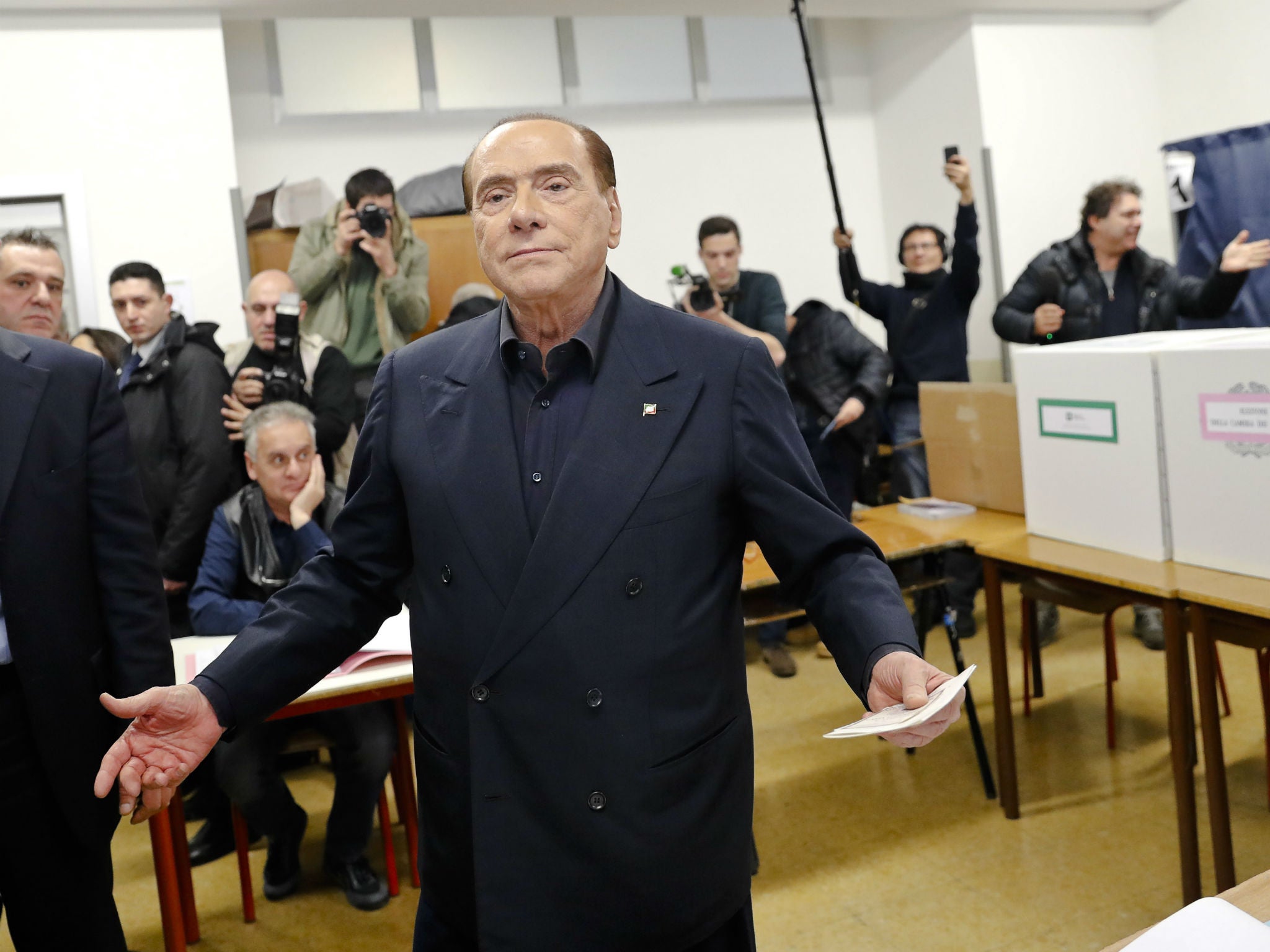Perhaps the most surprising part of the Italian crisis is that Berlusconi has emerged as a selfless voice of reason
The rebirth of Il Cavaliere is also due to the fact that he is seemingly invincible – and reflects how far down this country has sunk


Since the 1970s, my family has been based in the Lazio countryside north of Rome. Like my peers who were born in Italy in the late 1990s, I have grown up against the political backdrop of Silvio Berlusconi, a whirlwind of bunga-bunga parties and glitzy celebrity lifestyles, culminating in his conviction for tax fraud in 2012 which resulted in Il Cavaliere (the knight) being banned from holding public office for six years.
Despite his enduring appeal to a large part of the Italian electorate, the educated middle classes, foreigners and the international press have always considered Berlusconi an object of ridicule. Some of his worst gaffes – ones which I will never forget – include his denial that Mussolini ever killed anyone, his claim that he is the “Jesus Christ of politics, a victim”, and his statement that “we must be aware of the superiority of our [western] civilisation”.
At the time, it angered and worried me greatly that Italians of my generation would grow up hearing the leader of their country make such remarks. His innumerable blunders, ranging from the inappropriate to the downright offensive, shocked the world and embarrassed Italy on the global stage.
Living in Rome, I followed the elections on 4 March and the ensuing political drama very closely. I felt a mixture of dismay, frustration and disbelief as I came to realise that, of all the Italian politicians and party leaders with any clout, Berlusconi had somehow become the most favourable.
Matteo Salvini of the Lega (League) and Luigi Di Maio of the Five Star Movement (M5S), the leaders of the two parties who have recently failed to form a government, are both curveballs with highly risky and xenophobic proposals. It now seems to me that Berlusconi is not only the safest bet, but actually the best of a bad bunch. How has it come to this?
The left crumbled long before the election, with the former prime minister Matteo Renzi, of the left-wing Democratic Party (PD), resigning after his catastrophic constitutional referendum in December 2016 and a caretaker government taking up the reins. The populist M5S polled 32 per cent in the March election, the largest share of the vote. Founded by comedian Beppe Grillo, it is now headed by 31-year-old Luigi Di Maio, continually dubbed by the press (perhaps cruelly) as an “ex-waiter” and building site labourer. The Lega, once known as the Northern League, is a far-right party characterised by its extremist, racist rhetoric and wild economic policies, including its proposal to introduce a parallel currency to the euro for domestic use.
Today marks 86 days without a government, a record even for Italy. Two days ago, President Mattarella exercised his constitutional powers and rejected the appointment of Eurosceptic Paolo Savona as economy minister, rightly fearful of the consequences such an appointment might have on the markets.
Di Maio’s subsequent calls for the impeachment of the president left me with a deep and gathering sense of unease. But then came Berlusconi to the rescue. His statement that he respected the president’s decision and claim that Di Maio’s calls for impeachment were typical of the irresponsible M5S was a welcome defence of the president, who had acted out of duty to protect Italians’ savings from financial instability.
Crucially, during this week’s political crisis, Berlusconi is standing in solidarity with the president (a moderate and respected figure on the world stage who remains staunchly loyal to the euro). Who would ever have thought that Berlusconi, once an international object of ridicule and famous for his self-interest, would behave in the best interests of Italy and the Italians? And even more surprising is his apparent emergence as the voice of reason.
It is in this muddy and unprecedented political climate that, with great incredulity, it dawned on me that all of a sudden Berlusconi is more of a force for good than ever before. Having served as prime minister of Italy three times, he has been a major player on the Italian political scene since 1994. He has extensive experience in both national and international politics and, most importantly, we know what an Italy under Berlusconi looks like.
Over a coffee in the piazza I discussed these ideas with an Italian friend, a staunch adherent to the left. He told me that he was as shocked as I am by Berlusconi’s transition from object of ridicule to apparent voice of reason, agreeing that this is a reflection of the absurd and desperate depths to which Italy and its political situation have sunk.
The rebirth of Il Cavaliere is also due to the fact that he is seemingly invincible. Director Paolo Sorrentino described his recent film Loro, inspired by real-life events from 2006 to 2010 concerning Berlusconi and the sordid and corrupt world that mushroomed around him, as “neither pro- nor anti- Berlusconi. It is instead a tender look at the weaknesses of an old man.” Nonetheless, it certainly cast him in a terrible light and, inevitably, mud was flung. Yet none of the mud flung has stuck and it never does.
There’s truth in Oscar Wilde’s claim that the only thing worse than being talked about is not being talked about: despite the negative publicity, Berlusconi has continued to surf the choppy seas with that great white grin. He seems to have an innate capacity to bounce back. And, while it seems too good to be true (and it may well be), for now Berlusconi is using his comeback to defend the status quo from the populists. Maybe, while Italy rides this populist storm, Berlusconi’s experienced hand on the tiller is just what the country needs.
I cannot believe I am writing these words, but faced with the alternatives, Berlusconi might not so bad after all. In May, a court in Milan lifted the ban on him holding public office, a year before it was due to expire. With elections in the autumn almost inevitable, will the knight in shining armour make a comeback and save Italy from his own coalition partner, the racist, Eurosceptic Lega? Unlikely. But Berlusconi may well be Italy, and Europe’s best hope. Better the devil you know.
Join our commenting forum
Join thought-provoking conversations, follow other Independent readers and see their replies
Comments